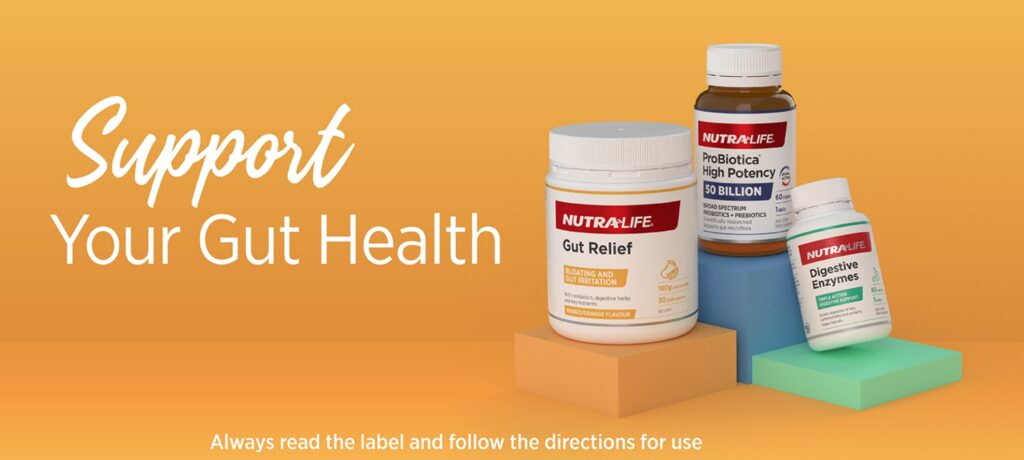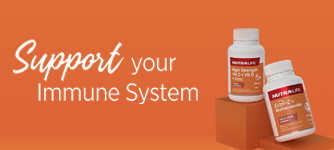Many aspects of modern life such as high stress levels, eating processed and high-sugar foods, and taking antibiotics can all impact our gut microbiota and cause gastrointestinal issues. This in turn may affect other aspects of our health, such as our immune system, skin, weight, hormone levels, and our ability to absorb nutrients properly.
Given the gut microbiota is a complex and dynamic ecosystem that can easily be disrupted, how can we best maintain a healthy balance of microorganisms to optimise gut health?
Reduce stress
If you’ve ever been so anxious that you had butterflies in your stomach, then you know how stress can affect your digestive system. The gastrointestinal tract is sensitive to emotion. Anger, anxiety, sadness, — all of these feelings (and others) can trigger symptoms in the gut.[1]
The gut has its own network of neurons in the lining of the gastrointestinal system, known as the enteric nervous system.[2] It relies on the same types of neurons and neurotransmitters that are found in the central nervous system (brain and spinal cord), so it is sometimes referred to as the ‘second brain’.[2]
Given the connection between the nervous system and gut function, stress levels need to be managed, especially if you experience gastrointestinal issues such as Irritable Bowel Syndrome (IBS).[3] Breathing and relaxation techniques as well as physical activity have proven useful in alleviating or helping to manage stress.[3]
Reduce toxins where possible
Toxins in our diets, such as processed foods, sugar, refined starch and artificial sweeteners, as well as the use of antibiotics, can cause gut dysbiosis (an imbalance of bacteria in the gut).[4]
To encourage bacterial diversity and a healthy balance of gut bacteria, ensure your diet includes a wide variety of whole foods, such as fruits, vegetables and whole grains.[5] Steer clear of processed foods, sugar and too much alcohol.[5] If you have been prescribed an antibiotic, take a probiotic alongside it (but a few hours apart from each other) to help prevent antibiotic-associated diarrhoea and maintain healthy levels of ‘good’ bacteria in the gut.[6]
Manage food intolerances
If you have symptoms such as cramping, bloating, abdominal pain, diarrhoea, and indigestion, you may be suffering from a food intolerance.[7] You can try eliminating common trigger foods to see if your symptoms improve.
Adding probiotics (live, ‘good’ bacteria) and prebiotics (foods that promote the growth of ‘good’ bacteria) to your diet, can also help maintain a healthy gut microbiota.[7]
Furthermore, supplementing with a gut relief powder, which also contains prebiotics, such as Nutra-Life Gut Relief Powder, may help relieve indigestion, soothe the gut lining, relieve gut irritation, help maintain healthy digestive function, and stimulate the growth of good bacteria in the colon (large intestine). Always read the label, use only as directed, if symptoms persist, consult your healthcare practitioner.
[1] https://www.health.harvard.edu/diseases-and-conditions/the-gut-brain-connection
[2] https://www.health.harvard.edu/newsletter_article/stress-and-the-sensitive-gut
[3]https://www.hopkinsmedicine.org/gastroenterology_hepatology/_pdfs/small_large_intestine/irritable_bowel_byndrome_IBS.pdf
[4] http://www.thegoodgut.org/8-foods-toxins-that-harm-our-gut-bacteria/
[5] https://www.healthline.com/nutrition/8-things-that-harm-gut-bacteria#section6
6] https://www.healthline.com/nutrition/what-to-eat-antibiotics#section2
[7] https://www.healthline.com/health/gut-health#treatment[/vc_column_text][/vc_column][/vc_row]










